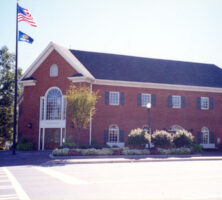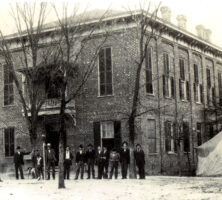Alpharetta is located in metropolitan Atlanta, approximately twenty-five miles north of the city in the foothills of the north Georgia mountains.
The Alpharetta area was first part of Cherokee County and then, for almost seventy-five years, part of Milton County, which in turn became part of Fulton County in the early 1930s. In earlier years the rural citizens around Alpharetta thrived on cotton production, and the townspeople on family businesses and shops. Today the countryside boasts horse farms, upscale residences, and eleven country clubs, and the city attracts national and international corporate headquarters.
The Pioneers
Natural springs attracted the Cherokee Indians to the area. After the state distributed the Cherokee lands to whites in an 1832 lottery, the spot became a stopover for white pioneers traveling between the mountain communities and the railroad terminus that was eventually named Atlanta. Trading posts were common, and bartering was a way of life.
Originally a conglomeration of tents called New Prospect Camp Ground, Alpharetta was incorporated in 1858, when it became the county seat for the newly created Milton County. Today many north Fulton County streets and roads—for example, Bates, Broadwell, Dorris, Hembree, Mansell, Maxwell, Mayfield, Phillips, Rucker, Webb, Wills—are named for the pioneering families of the Alpharetta area.
Milton County Years
The boundaries of Alpharetta were originally defined as one-half mile in every direction from the center of town. Area settlers, mostly Methodists or Baptists, were farmers, blacksmiths, millers, merchants, carpenters, ditchers, and the like. Some owned a few enslaved people. During the Civil War (1861-65) the men served on battlefields or in the home guard, but Union troops never came north of Roswell, approximately six miles to the southwest.

The courthouse anchored the town’s crossroads, and the four streets stemming from it were flanked by commercial structures that gave way to in-town homes. Alpharetta offered hotels, an academy, a bank, and the Alpharetta Free Press. For many decades “cotton was king” in the outlying areas. Most of the cotton was ginned and warehoused in town and sold to the Roswell textile mills. In the years between the two world wars, boll weevil invasions and the Great Depression took a toll on the area’s cotton economy. The merger of Milton and Fulton counties in 1932 brought relief in the form of lower taxes, paved roads, and improved educational facilities.
Fulton County Years
Gradually, annexations and the advent of Georgia 400, a major highway that bisected the city, resulted in a major economic and commercial shift. Alpharetta’s population was 3,128 in 1980 but has grown to 65,818, according to the 2020 U.S. census.

Reflecting its phenomenal growth, as of 2002 Alpharetta had twenty-two hotels and motels; North Point Mall had become a focal point for new business offices, shops, theaters, and restaurants. The award-winning Mobil Land community of Windward, a commercial development, included corporate offices and spacious lakeside residences. Family attractions included numerous antique shops; the Wills Park Equestrian Center, which hosts multi-event horse shows and polo matches; nature trails and parks; and a number of city-sponsored events. Alpharetta continues to grow commercially and residentially and to be a magnet for Atlanta-area newcomers.








